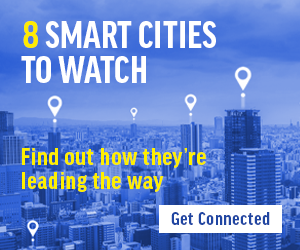Connected Vehicles Initiative Eases Mass Transit Throughout the Region
Solving problems is exactly what the Smart Columbus operating system aims to do. It serves as a data exchange where data from multiple sectors can be securely collected, aggregated, published and used to power solutions for communities, Bishop said.
Columbus began its smart city journey four years ago as a recipient of federal Department of Transportation Smart City Challenge grants. As such, fulfilling the goals of those original grant projects remains a pillar of the operating system's objectives, which include:
- Support the data ingestion needs of DOT grant projects
- Develop a platform that can be used by others
- Facilitate agency efficiency for city governments
- Establish a viable regional data platform to support the needs of community stakeholders
- Scale and sustain the platform to finance continued investment in smart city projects for the community
Columbus has invested mostly in its connected-vehicle environment, which runs along three high-volume roadways throughout the city and Ohio State University. The project seeks to support up to 1,000 connected vehicles of various configurations:
- Light vehicles, such as personal cars
- Emergency vehicles, such as police and fire fleets
- Heavy-duty vehicles, such as freight trucks
- Transit vehicles, such as city buses
To provide these with the connectivity required to receive alerts and other data, Smart Columbus has established a system of roadside and onboard units for vehicles, along with a heads-up display. The environment also includes technology to support a school zone management system, connected vehicle traffic management system and connected vehicle applications.
MORE FROM STATETECH: Learn how Columbus is evolving its smart mobility program.
Open-Source Application Connects Various Modes of Transportation
During a Smart Cities Connect panel, Smart Columbus Deputy Program Manager Andy Wolpert described Pivot, the city's multimodal trip planning application, in detail. The application supports the city's vision of on-demand and multimodal transportation with a shift away from personally owned vehicles.
Pivot strives to provide trip planning and booking seamlessly in one application. It aggregates data from public and private transportation sources to present customized trips based on user preferences, Wolpert said. The open-source platform is designed for adoption by other states, cities and agencies. It is flexible enough to accommodate different systems in various regions.
The app also supports citizens' special requirements, such as mobility assistance for people with cognitive disabilities and prenatal trip assistance, Wolpert said. Columbus is working to lower the infant mortality rate in Franklin County, Ohio, which is far above the national rate, according to Columbus. By applying technology to facilitate access to nonemergency medical trips, the city hopes to encourage more frequent trips to hospitals and thus ensure sustained pregnancy care.











